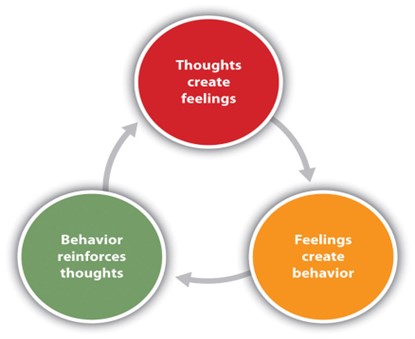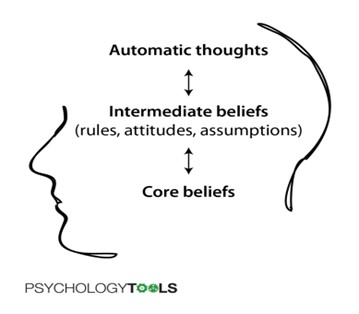Cognitive Behavioral therapy is a life savior for multiple mental health conditions where there is a profound suffering to combat a pattern of unhelpful chain of thoughts. These thoughts later manifest into behaviors that cause harm to self and others in some cases. Aaron Beck came up with this strategy to navigate through this vicious cycle.
Cognitive Behavior therapy training works by unraveling these negative patterns of thoughts very concretely, identifying the faulty perceptions, changing core beliefs and modifying behavior as a result. This is essential to dig into unresolved internal conflicts that unfold into maladaptive behaviors. Hence, this modality is based on a combination of one’s covert and overt mechanisms, making it holistic and as the most widely used therapy modality by mental health professionals.
HOW DOES COGNITIVE BEHAVIORAL THERAPY FUNCTION ONLINE?
Cognitive Behavioral therapy has been especially proven effective for Depression and Anxiety as it solidifies negative thought patterns and individuals with these conditions hold unrealistic beliefs. The application of CBT here helps develop a practical view and engage in healthy thoughts and behaviors.
Cognitive Behavioral therapy can be given online and offline. It works in the following manner:
- The sessions are spread out in a way that it is not a lot at once but also not too far apart that follow ups are compromised. There may be sessions once every week or once every two weeks with the therapist who facilitates the process of CBT with the client.
- The sessions last between 5 to 20 sessions with each one being for half or a whole hour.
- Assessment of the current mental status: This process revolves around making sense of how the covert and overt mechanisms operate independently. In other words, the client is educated about being able to separate mind and body to see how one affects another significantly and how they can be worked upon if paid careful attention to.
- Setting goals: Post the discovery phase of what is causing the trouble, the next step is to establish a management guide which is discussed by the therapist extensively.
- Practicing the learnt coping mechanisms: Once the identification and designing an appropriate method come by, now is the time for implementation by the client.
- The sessions later are utilized to analyze how the client gets through.
It all more or less comes down to working with self rationally by recognising the quite uncanny thoughts that translate to actions when not comprehended practically.
For instance, an individual with a diagnosis of Obsessive-Compulsive disorder stays inclined to performing certain ritualistic behaviors to overcome the obsessive thoughts that are usually negative and threatening to the individual. CBT here can come handy to deal with the pessimistic ideas.
WHERE IS THIS USEFUL?
Cognitive Behavioral therapy is useful in the following psychological disorders:
- Anxiety disorders (like Post-traumatic stress disorder, OCD, social anxiety and so on)
- Depression
- Eating disorders
- Sleep disorders
- Bipolar disorder
- Borderline personality disorder
- Psychosis
- Panic disorder
- Post traumatic stress disorder
- Irrational or unrealistic fears and phobias
- Daily hassles like challenges in personal or professional life
- Some emotional problems in children and teenagers
PROS AND CONS OF COGNITIVE BEHAVIORAL THERAPY:
There are several advantages and disadvantages using CBT for therapy which are as discussed below:
Advantages of Cognitive Behavioral therapy:
- It is extremely concise, straightforward and easy to follow.
- It can be accomplished in a specified time frame, perhaps in a short span of time.
- It follows a given structure making it easier to be attained in various formats like individually, in groups or even through online sessions.
- The entire focus is on making the client independent so they can apply the practical skills acquired in their daily lives effortlessly without any help from elsewhere.
- This can be conveniently accompanied with medicine in treating some mental disorders more effectively and efficiently.
Disadvantages of Cognitive Behavioral therapy:
- Intense engagement and cooperation from the client are required to successfully accomplish the tasks allotted by the therapist.
- It can be time consuming for many as it demands a highly active participation of the clients where it can also include a lot of work in between the sessions.
- This will not fit for every condition like people with intellectual disabilities may struggle to follow along.
- It addresses the present only, and may not touch upon the deeply rooted underlying triggers or causes from the past that instigated the present situation in the first place.
Hence, seeking cognitive behavioral therapy training online can be extremely useful if applied mindfully and received with an intent to work on self-consciously eliminating any resistance that may creep in along the way.
Why CoachForMind?
- Experienced Psychologists: We are a team of licensed RCI-registered clinical psychologists. Our team is well-experienced in various forms of therapy such as DBT, Narrative Therapy, and Cognitive Behavioral therapy training online.
- Personalized Approach: We are dedicated to treating our clients in the best-suited way, carefully curated as per the client’s needs, and adhering to one-on-one, client-centered therapy.
- Scientific Techniques: Our treatment plans and therapeutic methods are based on highly researched scientific findings such as CBT, DBT, and Narrative Therapy among many other therapeutic techniques used in art therapy counselling.
- Quality service: We at CoachForMind ensure quality services in our treatment regime and therapeutic approaches. Our clients hold most value to us, so we ground our techniques in empathy while maintaining professionalism.
For more information, please visit our website or contact us directly at coachformind@gmail.com







